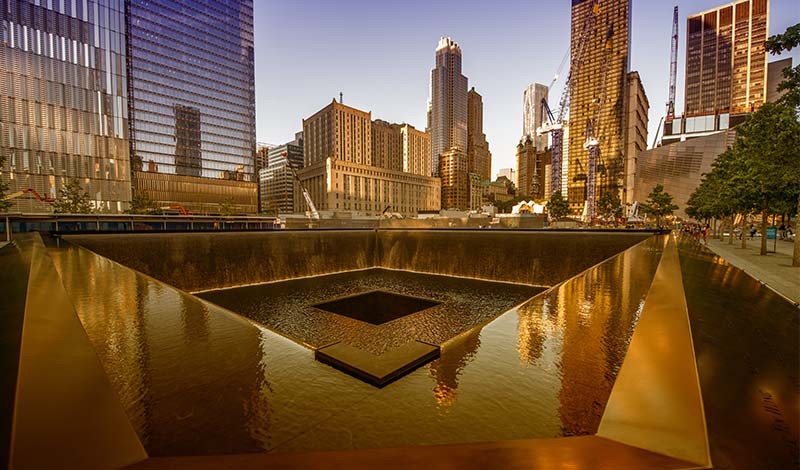The 9\11 documents: a closure or a Don Quixote windmill ?
The dark day of September 11th still hunts the world. Its social, political, religious implications are as present today as the first year of this tragedy. Yet, Muslims in foreign countries and Muslim majority countries are still in a defensive mode.

- by Rasha Al Joundy ,
- Thursday, 16th September, 2021
The dark day of September 11th still hunts the world. Its social, political, religious implications are as present today as the first year of this tragedy. Yet, Muslims in foreign countries and Muslim majority countries are still in a defensive mode.
Declassifying and publishing the documents of the 9\11 investigation is a long due step that took US governments two decades. It is vague why after President G.W Bush, neither President Clinton nor President Obama made a move to declassify these documents. Maybe they weren't under such pressure from victims' families and Congress as President Biden was. But the reason could be closing the wound while withdrawing from the first catastrophe resulting from these horrific attacks, Afghanistan. Finally, the step to declassify the documents could be practically ending the chapter responding to the 9\11 attacks and giving space to a new engagement policy even though the publishing process will take time to finish after reviewing.
While families' victims demanded the release, some media outlets had their own speculations and analysis of what evidence these documents could contain. And some had a questionable explanation for the delay. One of whom is the author of the Senate report on 9\11 that explained the delay by accusing the US institutions of covering evidence that will embarrass Saudi Arabia as a government, which is an outreach but can relate to many conspiracy theory stories that flourished after the attacks. These accusations don't implicate the Saudi Arabia government but President George W Bush, who led two wars to avenge the 9/11 attacks, and the three presidents who came after him.
In an official declaration, Attorney General William Barr insisted that documents relevant to the 9\11 case had to be protected as a state secret and that their disclosure risked significant harm to the national security. With no elaboration on how it could cause harm to national security. Assumptions lead to US-Saudi relations; even though Saudi officials asked President Bush to publish these documents and end all speculations, Saudi Arabia's lawyers vehemently denied allegations that Saudi Arabia had anything to do with financing the terrorist attacks. Barr's statement could be a brief but not clear explanation of twenty years' unclassified documents. At the same time, President Bush's explanation was related to the ongoing war on terror and the danger of exposing sources and methods to the enemy. Thus, could the decision to declassify these documents mean ending the war on terror?
Looking into these released documents, indeed, they didn't reveal anything that was not known before. It is the security gaps and the ideological mismanagement in dealing with either Jihadist groups or extremist views. These dangerous elements were neglected as irrelevant and as a pandora box that should be kept closed. But, unfortunately, the pandora box was opened, and it reached all aspects of life in the US and beyond. No country on the international stage had a comprehensive strategy to deal with such threats. The 9/11 attacks and the spread of unchecked terrorist militias proved there was no solid strategy to deal with the implications of incitement of violence or establishing a lawful organization to help build a cell that breeds such mentality. This fact is correct for both the US, the subject of these attacks, and Saudi Arabia, which was shocked to find out that 15 of its nationals attacked its number one ally. The National Commission on terrorist attacks upon the US mentioned its report that "some funds raised in the United States may have made their way to al Qaeda and its affiliated groups."
Saudi Arabia has been subject to hundreds of terrorist attacks on its soil since the nineties. The attacks culminated in 2003, signaling that the Kingdom is as targeted by Al-Qaeda as any other foreign nation. In 2004 the 9/11 Commission declared that "the Kingdom of Saudi Arabia is now locked in mortal combat with al Qaeda." The US-Saudi cooperation after 9/11 magnified and was more strategic than ever for both countries. Intelligence sharing and training programs flourished to enhance the mutual capability to face a common enemy. One of many bilateral agreements signed between the US and the Kingdom to combat terrorism was in 2008 on Technical cooperation that helps the kingdom "protect areas of critical infrastructure, border protection..". In 2010, Saudi Arabia gave the US intelligence information to foil an attack against cargo planes using explosive packages. Also, in 2014, Saudi Arabia was first in line to lead an Islamic coalition to combat ISIS. This is the outcome of a true partnership.
Combating terrorism and extremism is regarded as a cornerstone in US-Saudi relations. This is why even with 15 Saudi nationals among the hijackers, the US administration never doubted its partner's intentions. It is politically unrealistic to think that the Saudis who depend on US security ambarella would sabotage this relationship, leaving themselves vulnerable not only to Al-Qaeda and other terrorist organizations but also to Iran and its terrorists' cells.
Saudi Arabia needed a new policy to defend its nation from destructive ideologies. On the social level, Saudi's public sphere needs to resemble its energetic youth who aspire to a restriction-free society, innovation, connectivity, and flourishing labor market. Saudi religious institutions need to leave the debate to reformists' moderate class, which was silent and intimidated by ultraconservative influence in the formal religious institution and their hegemony over the social fabric itself.
Crown Prince Mohamed bin Salman shocked the world when he declared a welcoming return to moderate Islam, pointing out the mistakes been made in interpreting Islam during previous decades. And that he is ready to eradicate extremism and any destructive ideas today and now. He was pointing out his intention to eliminate extremism and declared what many perceived as a war against the past, and an intellectual war is what Saudi Arabia wanted indeed.
Saudi Arabia has changed significantly since the 9/11 attacks. In 2021 it is almost unrecognizable. The government worked on changing the scope of its schoolbooks, omitting what was perceived as sectarian and anti-Semitic language. The US Department of state's 2020 Report on International Religious Freedom praised the Saudi government and newspapers' many steps for advocating interreligious tolerance and dialogue. Secretary-General of the Muslim World League announced that Saudi Arabia would not manage or finance Mosques or Islamic centers outside its national borders, ending an extended foreign policy supported religious institutions to spread influence.
The religious police don't have the power they once had. Conservative preacher Al-Qarni apologized for his hardline interpretation of Islam and called for more modernized Islam backing the new stream of ideas Crown Prince Mohamed bin Salman was advocating for. And as simple as it sounds, a woman won a legal battle on the right to choose where to live. Women can now drive to work. There is a governmental policy to enable women in the labor market, either in the private sector or in government posts, including military and security institutions ending a long tradition to exclude women from public life.
Ending gender segregation, backing gender equality, religious reform are new terms in approaching a Saudi Arabia discourse. But it has been the norm for the last few years. Maybe some commentators like to analyze the intentions behind these reforms. But the youth and women in particular -who joined the workforce and aspired for more rights and freedom- are more significant. The norm of combating extremists' views and hegemony over society are more relevant.
Saudi Arabia was hit by terrorism for decades, but who is fighting today is the people, and they are building their capabilities with confidence and power. Thus, using the 9\11 documents to assume facts never published or mentioned yet, could be another revenge using a different weapon against a longstanding ally, most notably against a different generation who lives in a changed Saudi Arabia. Therefore, one should be careful that the long-awaited closure could turn into inventing a new mirage-enemy while starting a Don Quixote windmill confrontation.

Rasha Al Joundy
Research Supervisor
Read More
Areas of Expertise
- Expert in the Gulf region politics,
- Security and internal affairs and has been working on the GCC region since 2011.
Education
- Master’s degree in International Relations and World Order at Leicester University (UK 2016).
- Graduated from the Faculty of Law – University of Damascus in Syria in 2006
Bio
completed her master’s degree in International Relations and World Order at Leicester University (UK 2016). She graduated from the Faculty of Law – University of Damascus in Syria in 2006, and trained as a lawyer to register at Damascus bar association. She is an expert in the Gulf region politics, security and internal affairs and has been working on this region since 2011. Rasha Currently work as a senior researcher for Gulf affairs and supervise the training program at Dubai Pubic Policy Research Centre.

